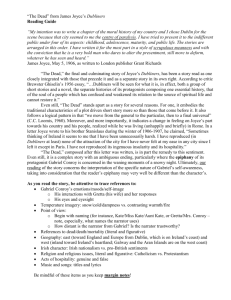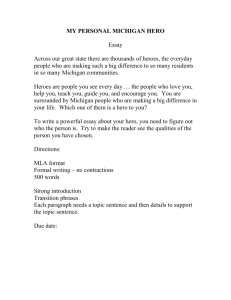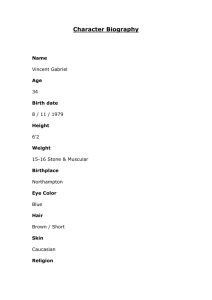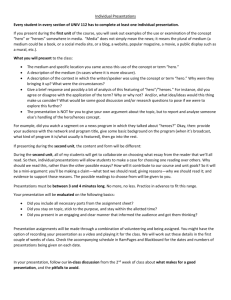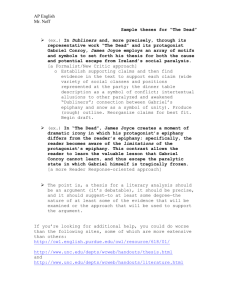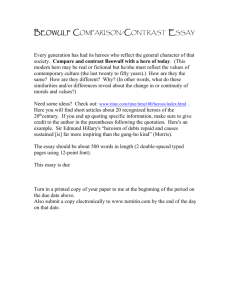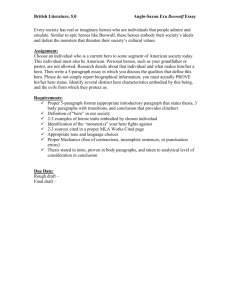File - Eddie Moore Jr III
advertisement
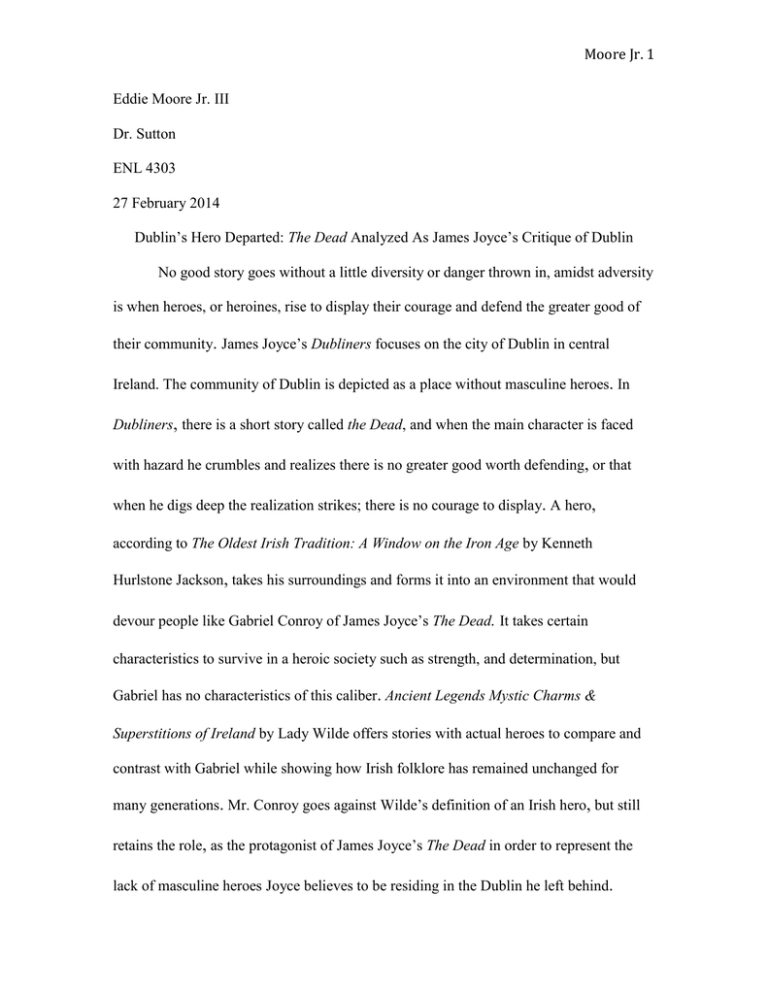
Moore Jr. 1 Eddie Moore Jr. III Dr. Sutton ENL 4303 27 February 2014 Dublin’s Hero Departed: The Dead Analyzed As James Joyce’s Critique of Dublin No good story goes without a little diversity or danger thrown in, amidst adversity is when heroes, or heroines, rise to display their courage and defend the greater good of their community. James Joyce’s Dubliners focuses on the city of Dublin in central Ireland. The community of Dublin is depicted as a place without masculine heroes. In Dubliners, there is a short story called the Dead, and when the main character is faced with hazard he crumbles and realizes there is no greater good worth defending, or that when he digs deep the realization strikes; there is no courage to display. A hero, according to The Oldest Irish Tradition: A Window on the Iron Age by Kenneth Hurlstone Jackson, takes his surroundings and forms it into an environment that would devour people like Gabriel Conroy of James Joyce’s The Dead. It takes certain characteristics to survive in a heroic society such as strength, and determination, but Gabriel has no characteristics of this caliber. Ancient Legends Mystic Charms & Superstitions of Ireland by Lady Wilde offers stories with actual heroes to compare and contrast with Gabriel while showing how Irish folklore has remained unchanged for many generations. Mr. Conroy goes against Wilde’s definition of an Irish hero, but still retains the role, as the protagonist of James Joyce’s The Dead in order to represent the lack of masculine heroes Joyce believes to be residing in the Dublin he left behind. Moore Jr. 2 Hero is a term used internationally, but in different languages. Webster defines a hero/heroine as “a man of distinguished valor or enterprise in danger, or fortitude in suffering; a prominent person in any remarkable event; hence a great person”1 a person does not have to be in danger to be a hero, although it does help. A hero can be present in any action. The focus of this paper will lie on a not so great person, Gabriel Conroy, of Dubliners, and his lack of heroic qualities while he maintains a protagonist role in The Dead. Lady Wilde has collected ancient stories in the book Ancient Legends Mystic Charms & Superstitions of Ireland, to be used for reference here in the essay to contrast Mr. Conroy’s attitude. Gabriel’s actions required a separate source; Kenneth Jackson’s The Oldest Irish Tradition will be used to provide alternative, ideal realities for Gabriel’s awkward encounters. Heroes are always at home, even in the earliest of traceable Irish tales heroes have been adapting to their environment and always surrounding themselves in a “heroic society” (Jackson 8) a heroic society is defined as “a warrior aristocracy in the sense that it is organized for the warfare which is its business.” (Jackson 8) Any business conducted by a hero is taken seriously and is handled with the upmost care. Warfare is to never being taken lightly and is enjoyed by some heroes; this is when they thrive at displaying moral character and defending the greater good. Gabriel finds himself in an un-friendly environment at verbal warfare with different opponents at a family dinner party. 1 http://www.webster-dictionary.org/definition/hero Moore Jr. 3 Generosity is evident through heroic tales, but is not usually displayed by male heroes. Gabriel demonstrates the Christmas Spirit by giving the young girl a large tip but he does not gain any claim to being called a hero. In “The Legend of Bally Towtas Castle” (Wilde pg15) a woman givers her everything to, who appears to be the main character, but he dies immediately after. Neither the giver nor the receiver was a winner in that situation, leaving no hero to take center stage. Having supernatural powers, to a certain point, could be equal to having wealth, a confusing concept brought to light by Jackson “Economically speaking it is chiefly a cattle-rearing community in Ireland, and cattle are the staple form of wealth and the aim of much of the raiding and fighting. We learn more about the structure of the earliest traceable Irish society from the Law tracts” (Jackson 9) the hierarchy for their law tacts started with the king up top and below people fell in line in relation of their value to the king. Having wealth would be helpful to an individual, would help the king because of taxes, but a king has money, a king has everything in the land he desires. But magic is controlled only by the person with supernatural powers, and cannot be given away with generosity. Being a hero is supernatural in the fact you cannot give it away or receive it from someone, and therefore being a hero could have earned you a spot in a kings hierarchy higher than money could. The story, The Dead, by James Joyce takes place at a popular dance attended annually by anyone who knows the hosting family; a typical main character would thrive at transforming this party into a perfect heroic society. Gabriel runs into constant trouble attempting to take control of situations at the party, simple conversations evade him in ways that are awkward to read, and he shows disrespect towards women. Instead of Moore Jr. 4 arriving fashionably late like a cool hero should, Gabriel is the second to last to arrive at the party, and shows up in galoshes. This character is too out of style, and too late, to be fashionably late. Had his unpunctuality not ruined being fashionably late, Mr. Conroy’s fashion certainly would have. Gabriel immediately blames his wife for their tardiness “Miss Kate and Miss Julia thought you were never coming. Goodnight, Mrs. Conroy’ ‘ill engage they did,’ said Gabriel, ‘but they forget that my wife here takes three mortal hours to dress herself” (Joyce 120) Gabriel whines about his wife’s tardiness yet as she goes to join the party before him, he remains downstairs removing snow from his galoshes and chatting up an extremely young coat girl. This long and weird conversation with the coat girl is accompanied by Gabriel removing snow from his removable galoshes. Gabe could have simply removed his galoshes, and gone upstairs to join his wife, and avoid so much criticism, and suspicion from critics, but instead he chose to linger. “The Horned Women” from Lady Wilde’s Ancient Legends Mystic Charms & Superstitions of Ireland is one of Irelands oldest mythical stories, dating back to at least one thousand years. Witches plague the female hero until a mythical well offers her a solution; the tale shows Irelands aged respect for the feminine. A respect for women Gabriel needs to learn. With the ladies a hero is smooth, respectful, and confident, but Gabriel on the other hand is awkward and arrogant. Gabriel reveals his self-importance while coping with a disturbed feeling left by the conversation with the coat girl “It had cast a gloom over which he tried to dispel by arranging his cuffs and the bows of his tie. He then took Moore Jr. 5 from his waistcoat pocket a little paper and glanced at the headings he had made for his speech. He was undecided about the lines from Robert Browning, for he feared they would be above the heads of his hearers.” (121) A hero would not let a coat girl interfere with his mood for the night, and a true hero or heroine knows their place and respects their peers. Since there is this disturbance the conversation with the coat girl did not go as planned for Gabriel, but the disrespect to his future audience’s intelligence was uncalled for. Gabriel fails to display modesty as a true hero would, and he indefinitely lacks humility at his core. The confidence could add to his list of characteristics one thing of heroic value, but the Dubliner protagonist takes it too far. His confidence has clouded his mind at this moment and consumed all signs of humbleness. But here is where Gabriel finally displays one heroic trait. A true Irish hero respects women for their inner as well as their outer beauty, especially if that woman is the mother of his children. Moms are some of the most compassionate creatures no matter what species, and do not deserve to be ridiculed by fathers like Gabriel. Here Gabriel examines his wife, and after he gets jealous describes Mrs. Conroy “and, as he thought what she must have been, in that time of her first girlish beauty, a strange, friendly pity for her entered his soul. He did not like to say even to himself that her face was no longer beautiful, but he knew that it was no longer the face for which Michael Furey had braved death” (151) Gabriel feels sorry for how his wife looks, he can see her beauty, but it is in the intangible past. Michael Furey was a sixteen- Moore Jr. 6 year-old romanticist Mrs. Conroy use to know, and the reason for Gabriel’s jealousy. In the story Gabriel has a right to be upset with his wife, but this is not an outburst, Mr. Conroy is calmly sitting next to his wife contemplating. The sleeping Mrs. Conroy has no idea about the criticism and ridicule being rained down from her gazing husband, who ironically is unable to be aware that he is a suspected rapist. There are some good stories without heroes, and most of them are from ancient Ireland, still being deciphered from their Celtic origins. According to the tales collected by Wilde there was a heavy lack of masculine heroes compared to common day society, where a new hero makes a movie every month. Joyce was able create an enticing book of short stories without heroes in tribute to ancient Ireland. Joyce demonstrates his writing talent by transcribing interesting stories without strong masculine heroes like his Celtic forefathers had done. The deficiency of heroes, in Dubliners, mirrors James Joyce’s averting of Dublin, he never returned as the. Once the literary hero left Dublin there was no one to follow, no one but people like Gabriel. If Gabriel is the best available for Dublin since Joyce has departed, the one lingering question, why did Gabriel just not remove his galoshes? Is sidekick to where are the heroes? Moore Jr. 7 Works cited Jackson, Kenneth Hurlstone. The Oldest Irish Tradition; a Window on the Iron Age. Cambridge: U, 1964. Google Books. Cambridge. Web. <http://books.google.com/books?hl=en&lr=&id=pkTUotRW8_AC&oi=fnd&pg= PA1&dq=irish+heroes&ots=OwVIDZ9rt2&sig=r1kHggoc34VxCtooBwankxnXx Fo#v=onepage&q=irish%20heroes&f=false>. Joyce, James. Dubliners. New York: Dover Publications, 1991. Print Wilde. Ancient Legends, Mystic Charms & Superstitions of Ireland: With Sketches of the Irish past. London: Ward and Downey, 1888. Google Books. Cambridge. Web. <http://books.google.com/books?hl=en&lr=&id=R3GSX_IkdIC&oi=fnd&pg=PA1&dq=irish+legends&ots=4TUEDcAgi1&sig=h3VRquoT RKWaHOy4RtznY_qZ0DU#v=onepage&q=irish%20legends&f=false>.
